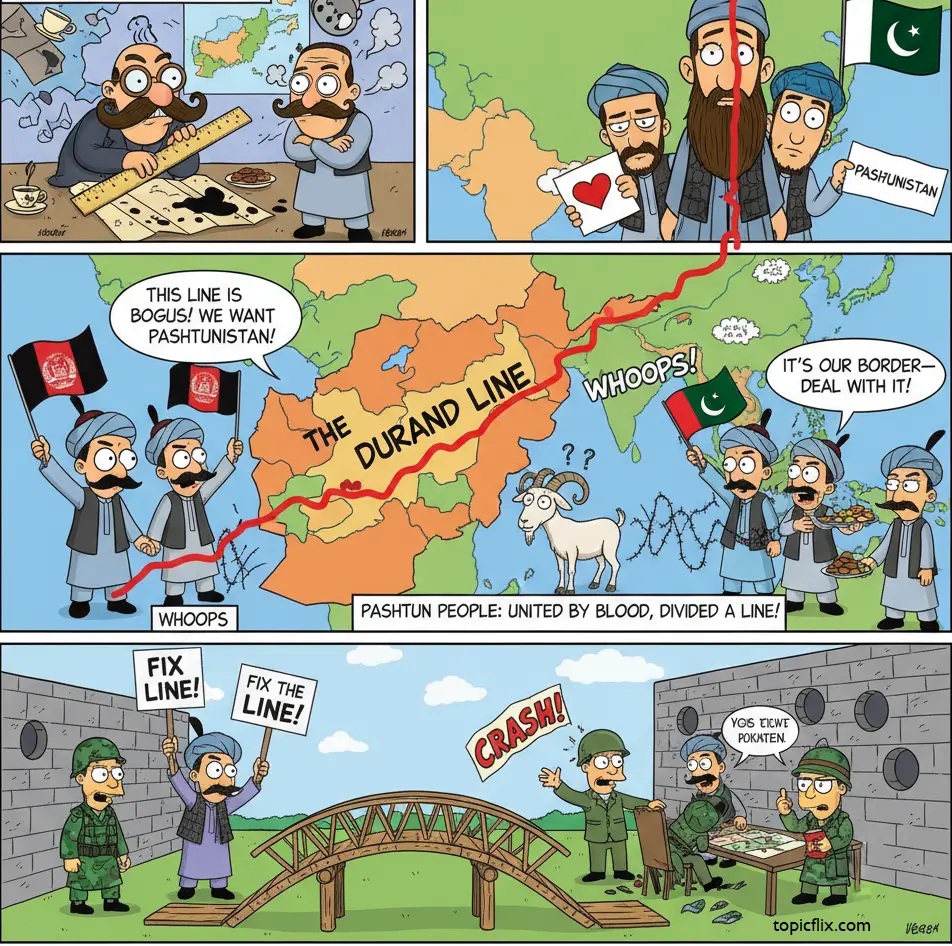The “conflicts” between Pakistan and Afghanistan are primarily due to borders, power politics, and regional rivalries. Religion plays a factor in culture, but the main tensions stem from geopolitics and security concerns that intersect borders and ethnic groups.
Durand Line Dispute and Pashtun Nationalism
The main causes of the conflict are the Durand Line and border disputes, a 2,640-kilometer (1,640 mi) long border. In 1893, the British drew the Durand Line to separate present-day Afghanistan from British India.
Afghanistan has never recognized the Durand Line, arguing that it should not be considered a border until the Pashtun areas on both sides are unified. Afghanistan has historically supported the idea of ”Pashtunistan,” a separate homeland for the Pashtun people. It arbitrarily divides the Pashtun ethnic population between the two countries.

Pakistan, however, considers the Durand Line to be the legitimate border. This unresolved border dispute fuels mistrust and cross-border friction. Afghanistan and Pakistan also share a strong attachment to the Pashtun homeland and mutual kinship across the border. Large Pashtun communities live on both sides of the border.
Soviet Invasion and the Role of Pakistan
The Soviet Union’s invasion of Afghanistan from 1979 to 1989 resulted in the Soviet–Afghan War. Pakistan, with the support of the United States and other Western countries, played a key role in supporting the Afghan mujahideen (resistance fighters).
This helped drive out Soviet forces but also fractured and damaged Afghanistan’s internal political dynamics, resulting in the rise of various tribal warlords and terrorist groups. After the war, Pakistan cooperated with and supported many of these factions within Afghanistan, which were opposed by many other Afghan groups.

Taliban and Militancy
Pakistan has supported and cooperated with the Taliban movement since the 1990s, helping it gain control of much of Afghanistan in 1996. Moderate Afghan groups have become resentful of the Taliban and hostile towards Pakistan.
Various Afghan factions and subsequent governments have accused Pakistan of harboring and supporting the Taliban, particularly in the years after 2001, when the Taliban regrouped and launched an insurgency from safe havens in Pakistan. Even after the Taliban returned to power in 2021, relations remained strained due to border issues and mutual distrust.
Cross-Border Terrorism and Security Concerns
Both countries accuse each other of harboring terrorist groups that carry out attacks. For example, Pakistan accuses Afghanistan-based groups such as the Tehrik-i-Taliban Pakistan (TTP) of carrying out attacks on its soil, while Afghanistan accuses Pakistan of supporting insurgent groups such as the Haqqani Network and the Afghan Taliban.
Afghanistan’s good relations with India
Due to the India-Pakistan strategic rivalry and Afghanistan’s good relations with India, Pakistan views Indian influence in Afghanistan as a strategic threat. Afghanistan has repeatedly sought development assistance and political support from India as a counterweight to Pakistan. This has further exacerbated the already complex relationship.
Refugees and Economic Burdens
For decades, millions of Afghan refugees have flooded into Pakistan, along with porous borders and sometimes blocked trade routes, exacerbating economic and social tensions.

About the Author
Manish love to write and he is a Civil Servant. Users can follow Manish on Instagram ![]()
Alerts before a long trip, 5 emergency situations for long viator
Many people travel by themselves by car or any other vehicle. Before a long-trip journey…
31 Countries without army !! Really ?
Countries without an army, Is it really possible? We discovered more than 30 countries that…
Who is Lucy Robson ?
Lucy Robson who is undoubtedly the most beautiful and attractive golfer in the world. Lucy…
How Blue LED changed the world?
In 2014, the Nobel Prize was awarded to Japanese scientist Shuji Nakamura, who invented the…
Why American soldiers in Vietnam wore helmets with playing cards
The soldiers’s helmets in American movies about the Vietnam War frequently have playing cards on…
Why do Korean delivery drivers have more than one phone?
If you have been to South Korea and spent a few days there, you might…






